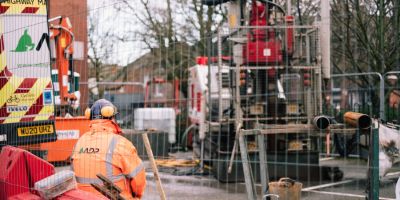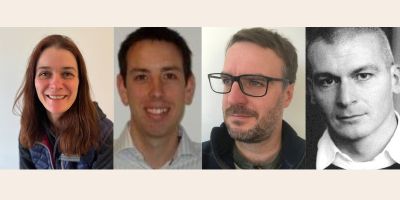Diffability Inclusive Disaster Preparedness Toolkit launched in Indonesia

Researchers have worked with people with diffability, practitioners and policymakers in Indonesia to improve their preparedness for and outcomes of disasters.
Dr Desy Pirmasari and Dr Katie McQuaid launched the Kayuh Baimbai: Diffability Inclusive Disaster Preparedness Toolkit in Banjarmasin, South Kalimantan, Indonesia alongside the Banjarmasin City Government and Antasari Islamic State University.
The project is co-led by Slamet Triyadi of the Indonesia Disabled People's Association (PPDI) and Barniah of the Indonesia Disabled Women’s Association (HWDI) – both themselves people with diffability (PWD).
Climate change, extreme weather and disasters
This project follows Desy and Katie’s research into Intersectional Experiences of Disability, Climate Change, and Disasters in Indonesia.
They explored how experiences of climate change, extreme weather and disasters affect people differently across diverse communities including people with diffabilities, older people, women, youth and informal workers.

Banjarmasin is vulnerable to two key disasters: flooding and fire, both of which are exacerbated by climate change.
Their research showed that due to systemic inequalities, people with diffability (PWD) are among the most vulnerable to disasters, suffering higher rates of morbidity and mortality. They are the least able to access support.
'Diffability' describes ‘different ability’. It originates from the Bahasa Indonesia term ‘difabilitas’ meaning different abilities, coined by two Indonesian diffability activists. The researchers use it to highlight people’s diverse capacities and ways of doing things, as opposed to focusing on their dis-abilities.
The Kayuh Baimbai toolkit for Diffability Inclusive Disaster Preparedness
The Kayuh Baimbai toolkit project raises awareness about the needs of PWD and creates sustainable opportunities for PWD to lead interventions and be heard and involved in decision-making about their own needs.
The Kayuh Baimbai toolkit:
- increases PWD awareness about risks and hazards in their area
- supports PWD readiness and recovery from disasters
- builds public support and understanding of how to support PWD
- increases capacity of the City Government and emergency responders to co-design and deliver Disability-inclusive Disaster Risk Reduction (DRR) actions in collaboration with PWD.
Slamet Triyadi, the Chair of PPDI, is blind and walks with crutches. He said “It's truly remarkable that the University of Leeds has shown trust in us by providing people with disabilities the opportunity to conduct surveys and participate in this project.
“They believe in our capabilities and we have demonstrated that we can succeed when given the opportunity and support. This is extraordinary for us.”
Increasing community knowledge
Kayuh Baimbai increases knowledge about diffability among emergency responders and offers new ways for the government to fulfil their commitments to diffability inclusion in disaster risk reduction.

Ibnu Sina, the Mayor of Banjarmasin City said “I wholeheartedly support the Kayuh Baimbai disaster preparedness project. This initiative is a crucial part of our commitment to achieve Banjarmasin as inclusive city.
“As part of our roadmap to becoming an inclusive city, we have put in place procedures and regulations that empower people with disabilities to work effectively and receive appropriate support during disasters.
“Given that Banjarmasin frequently faces fire-related disasters, it’s particularly important that people with disabilities receive special attention to prevent any casualties.”
Diffability Liaison Officers
The team recruited, trained and mentored 15 Diffability Liaison Officers (DLOs) from across the city’s districts.
DLOs visited people with diffability and spoke to them about the project to find out their current preparedness, attitudes and needs.
This activity highlighted some challenges, needs and lessons such as:
- There was little understanding of the importance of disaster preparedness, despite the regularity of disasters in the country;
- Some PWD don’t believe that a survey or discussion could help them or improve their situations, and don’t want to talk about their difficulties due to stigma;
- Data about PWD was lacking, so DLOs had to take extra steps to find them;
- The geographical conditions of the city are difficult for some PWD and places were hard to access;
- The diverse conditions of DLO meant that diverse assistive aids were needed;
- Working in groups meant that DLOs could help each other to navigate individual challenges.

Abdul Syahid, one of the DLOs, said: “There have been many highs and lows. It moves me deeply—please excuse my tears. This project is truly beneficial for us.
“When it comes to disabilities, my heart is always touched because we often face rejection and neglect from others who may think we are insignificant.
“I hope that through this project, representatives from various organizations, including the Regional Agency for Disaster Countermeasure (BPBD) and others, will come together and stand with us.”
Slamet spoke of the difficulties. "The challenging part during the survey was navigating the diverse geographical conditions as we visited house to house,” he said.
“Some routes to the homes of people with disabilities were difficult to access, with many roads pocked with holes and damaged alleys. Additionally, the swampy terrain of Banjarmasin compounded our difficulties.
“Despite these challenges, the joy of being trusted and actively involved in this project cannot be diminished.”
Launching the toolkit
The Kayuh Baimbai Diffability Inclusive Disaster Preparedness toolkit was officially launched on April 25th, 2024.
Over 110 people from various backgrounds joined the launch event, including government officials, people with diffabilities, academics, emergency responders and the general public.
The research team partnered with Antasari Islamic State University to disseminate the toolkit to reach a broader audience, increase awareness of the project and integrate the needs of PWD into academic syllabi, research and community services.
The toolkit received positive responses from government, private and state enterprises, and was covered by local and national media.
Among PWD communities, improved practicable knowledge on disaster risk reduction will strengthen their capacities to anticipate and act upon the risks around them.
We hope this project marks the beginning of a collective journey toward providing equal opportunities for people with diffabilities and achieving genuine inclusivity
Dr Desy Pirmasari, Project Lead of Kayuh Baimbai said: “The Kayuh Baimbai project is part of our initiative to normalise diffability, educating and informing the public that people with diffabilities are able and they have the same rights as others.
“We hope this project marks the beginning of a collective journey toward providing equal opportunities for people with diffabilities and achieving genuine inclusivity, to really walk the talk or beyond just lip service.
“We are grateful to the various stakeholders on the ground who have offered significant support, particularly the Banjarmasin city government, Regional Agency for Disaster Countermeasure (BPBD) BPBD, all districts and community members.
“We believe that to eliminate discrimination against marginalised communities involves increasing their visibility and ensuring they were given more opportunities to work and engage in various community activities.”
Our collaborators PPDI and HWDI are ensuring that social inclusion takes its rightful place at the heart of both government and community planning
Dr Katie McQuaid, Project Lead of GENERATE, said:
“The exciting thing about Kayuh Baimbai is that it takes our research and puts words into action, setting up new ways of putting people with diffabilities at the centre of designing and delivering new interventions. Ones that directly tackle their own priorities and address their lived experiences of exclusion and disasters.
“Our diffability liaison officers create a new vital link between communities and the emergency services and city government that oversee disaster risk reduction, and our collaborators PPDI and HWDI are ensuring that social inclusion takes its rightful place at the heart of both government and community planning.
“It realises our vision for applying creative research as a route to disaster justice - one that would be impossible without meaningful collaboration.”
Further information
- An audio-visual version of the toolkit is on YouTube in Bahasa Indonesia and Indonesian Sign Language
- The documentary about the production of the toolkit is on YouTube in Bahasa Indonesia
- The video documentary about the toolkit is on YouTube in English
- An English-spoken and captioned documentary about the production of the toolkit is on YouTube
- Visit the Kayuh Baimbai project page.




